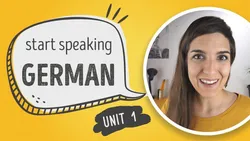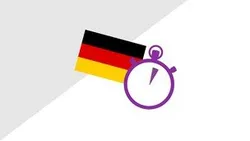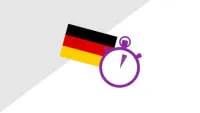
German Language for Beginners - Unit 1 - Meeting greeting introducing & more 
This German language course is designed for complete beginners. It introduces learners to the basics of the language, such as meeting, greeting, introducing and more. Through this course, learners will be able to gain the confidence to start speaking German and embark on their language learning journey. ▼
ADVERTISEMENT
Course Feature
![]() Cost:
Cost:
Free Trial
![]() Provider:
Provider:
Skillshare
![]() Certificate:
Certificate:
Paid Certification
![]() Language:
Language:
English
![]() Start Date:
Start Date:
On-Demand
Course Overview
❗The content presented here is sourced directly from Skillshare platform. For comprehensive course details, including enrollment information, simply click on the 'Go to class' link on our website.
Updated in [March 06th, 2023]
This course, German Language for Beginners - Unit 1 - Meeting greeting introducing & more, is designed to help complete beginners learn the basics of the German language. In this unit, learners will be introduced to the basics of German, such as how to introduce themselves and others, say where they are from, ask someone how they are and answer the question, use important phrases like 'thank you' or 'please', and how to build and use the present tense. Learners will also be taught many words and phrases to get them started with their German speaking.
At the end of the course, learners will be able to have a simple conversation in German and will be able to prove this in the project. The course is designed to be short, straight to the point, useful and fun, so that learners can quickly get started with their German language learning journey.
This course is perfect for those who are just starting out with German and want to learn the basics. It is also suitable for those who want to brush up on their German language skills. So, if you are ready to start your German language learning journey, join us on this adventure and let's get started!
[Applications]
After completing this course, students can apply their knowledge of German language by having simple conversations in German with native speakers. They can also use the present tense to ask and answer questions, as well as use important phrases such as 'thank you' and 'please'. Additionally, students can use the words and phrases they have learned to further their understanding of the language.
[Career Paths]
1. German Translator: German translators are responsible for translating written documents from German to English and vice versa. They must have a strong command of both languages and be able to accurately convey the meaning of the original text. Developing trends in this field include the use of machine translation and artificial intelligence to improve accuracy and speed of translation.
2. German Teacher: German teachers are responsible for teaching German language and culture to students of all ages. They must have a strong command of the language and be able to effectively communicate with their students. Developing trends in this field include the use of technology to enhance the learning experience, such as virtual reality and online learning platforms.
3. German Interpreter: German interpreters are responsible for providing simultaneous interpretation of spoken German into English and vice versa. They must have a strong command of both languages and be able to accurately convey the meaning of the original text. Developing trends in this field include the use of remote interpreting technology to provide interpretation services to a wider range of clients.
4. German Content Writer: German content writers are responsible for creating content in German for websites, blogs, and other digital media. They must have a strong command of the language and be able to effectively communicate with their audience. Developing trends in this field include the use of SEO and other digital marketing techniques to increase visibility and engagement.
[Education Paths]
Recommended degree paths:
1. Bachelor of Arts in German Language and Literature: This degree program provides students with a comprehensive understanding of the German language, its literature, and its culture. Students will learn about the history of the language, its grammar, and its literature. They will also gain an understanding of the culture and customs of German-speaking countries. This degree program is ideal for those who want to pursue a career in teaching, translation, or international relations.
2. Master of Arts in German Language and Literature: This degree program is designed for those who want to specialize in the German language and literature. Students will gain an in-depth understanding of the language, its literature, and its culture. They will also learn about the history of the language, its grammar, and its literature. This degree program is ideal for those who want to pursue a career in teaching, translation, or international relations.
3. Doctor of Philosophy in German Language and Literature: This degree program is designed for those who want to specialize in the German language and literature. Students will gain an in-depth understanding of the language, its literature, and its culture. They will also learn about the history of the language, its grammar, and its literature. This degree program is ideal for those who want to pursue a career in research, teaching, or translation.
4. Master of Science in German Language and Culture: This degree program is designed for those who want to specialize in the German language and culture. Students will gain an in-depth understanding of the language, its literature, and its culture. They will also learn about the history of the language, its grammar, and its literature. This degree program is ideal for those who want to pursue a career in teaching, translation, or international relations.
Developing trends in German language and literature include the use of technology to facilitate language learning, the use of digital media to promote cultural understanding, and the use of online resources to support language learning. Additionally, there is an increasing focus on intercultural communication and the use of German in international contexts.
Pros & Cons

Well structured

engaging

successful Goethe A1 exam

pronunciation tips

enjoyable

great pace

easy flow.

None mentioned.
Course Provider

Provider Skillshare's Stats at AZClass
Discussion and Reviews
0.0 (Based on 0 reviews)
Explore Similar Online Courses

Dart - Beginners Course

Free Image Editing Tutorial - Enhancing Photos for Complete Beginners

Python for Informatics: Exploring Information

Social Network Analysis

Introduction to Systematic Review and Meta-Analysis

The Analytics Edge

DCO042 - Python For Informatics

Causal Diagrams: Draw Your Assumptions Before Your Conclusions

Whole genome sequencing of bacterial genomes - tools and applications

3 Minute German - Free taster course Lessons for beginners

3 Minute German - Free taster course Lessons for beginners

Akzentfrei: Speak and sound like a native German - Part I
 Related Categories
Related Categories
 Popular Providers
Popular Providers
Quiz
 Submitted Sucessfully
Submitted Sucessfully
1. What will you learn in Unit 1?
2. What will you be able to do at the end of the course?
3. What is the project at the end of the course?
4. What is the goal of the course?
Correct Answer: To have a simple conversation in German.


Start your review of German Language for Beginners - Unit 1 - Meeting greeting introducing & more